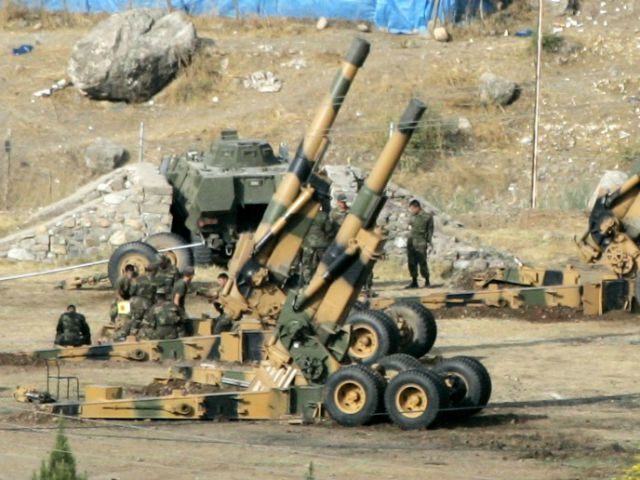Turkish Foreign Minister Mevlüt Çavuşoğlu confirmed on Thursday that Ankara is preparing for a new military operation in Iraq, backed by the government in Baghdad, against the Marxist Kurdistan Workers’ Party (PKK) terrorist group.
Turkey considers the PKK indistinguishable from most Kurdish groups, however, including the U.S.-allied People’s Protection Units (YPG/YPJ) in Syria. Given the Iraqi government’s assault against the Kurdistan Regional Government (KRG) that began in October, the joint effort raises concerns that Turkey may help Baghdad target Peshmerga forces, not just the PKK.
Çavuşoğlu suggested that the current Turkish anti-Kurdish operation, Operation Olive Branch, would likely conclude in May, when a new operation in Iraq would begin. Turkey invaded northern Syria’s Afrin region in January, claiming a national security need to attack U.S. allied Kurds in the region. Various Trump administration officials have stated that Turkey has “legitimate security concerns” in the area, validating the operation and not defending the YPG. In response, the Kurds have been forced to abandon efforts against the Islamic State to defend themselves from the Turkish military.
“We wish for it to finish as soon as possible, even before May,” Çavuşoğlu told reporters in Vienna, following his remarks about Iraq on the flight over.
The Turkish newspaper Hurriyet reports that Çavuşoğlu said before landing in Austria that Turkish troops will work with Iraqi forces in northern Iraq. The PKK is particularly prevalent in the Sinjar area, where local Yazidis have praised the fighters for confronting the Islamic State’s attempt at genocide against them when the KRG’s Peshmerga retreated. The PKK is anti-Islamist and friendly with the YPG, though not the Peshmerga. It remains, however, a U.S.-designated terror group.
Çavuşoğlu noted Turkey will wait until after the Iraqi parliamentary elections in May for the operation to begin. He emphasized that this, and not a fear of overstretching the Turkish military with projects in both Syria and Iraq, are the reason for the delay.
“Even if the Afrin operation has not yet been completed, we have the capacity to carry out both operations simultaneously,” he argued.
Reports indicate that the Afrin operation has not gone very smoothly for the Turkish military, significantly depleted after years of purges in its highest ranks following the failed coup against President Recep Tayyip Erdogan in 2016. The YPG, one of the most effective forces on the ground against the Islamic State, has prevented Turkey from expanding control far beyond the Turkey-Syria border and is likely to continue succeeding in this effort as reinforcements flood Afrin from areas where the militia was previously fighting ISIS.
Çavuşoğlu’s remarks come a week after Turkish chief-of-staff Gen. Hulusi Akar visited Baghdad to discuss military strategy with leaders there. “We would like to boost our relations and collaborate over the war against terrorism and border security,” Akar told reporters, without expanding on what sort of collaboration may come in the future.
Turkey has been warning that it has an interest in a military presence in Iraq for years.
“Unfortunately, PKK terrorists from different parts of Iraq have come to our country and organized attacks,” Çavuşoğlu told reporters in October 2016, demanding the PKK leave Sinjar and justifying a potential Turkish invasion of northern Iraq. Turkish Prime Minister Binali Yıldırım said at the time that Turkish soldiers would come to the aid of Peshmerga in Mosul, where the Islamic State had not yet been fully removed.
The role the Peshmerga may play in the current operation remains unclear. The Peshmerga have long endured tensions with the YPG and the PKK, which it has repeatedly demanded must leave Sinjar entirely. Yet while Erdogan had maintained friendly relations with the KRG for years, his invasion of Afrin triggered calls for sending Peshmerga into Syria to help the YPG. Kurdish officials warned that, while logistically challenging, they would consider moving the Peshmerga into Syria if necessary in January.
KRG Chancellor Masrour Barzani said in an interview this week that the KRG stands at the ready to mediate between Ankara and the YPG’s political wing if necessary.
“There are huge numbers of civilians who are caught in the middle of this conflict,” he explained. “We have historical and political relations with them. We are one nation. The solidarity is shown with the Kurdish people.”
Asked about the PKK, however, Barzani clarified, “We believe that if any Kurdish group or faction is from a different country they should focus on their own problems in their own country. Exporting their problems to a different country will only make things more complicated.”

COMMENTS
Please let us know if you're having issues with commenting.